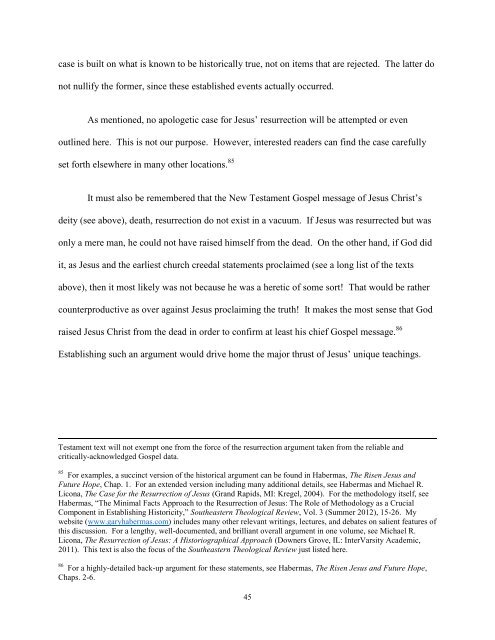Published by
299z7CN
299z7CN
You also want an ePaper? Increase the reach of your titles
YUMPU automatically turns print PDFs into web optimized ePapers that Google loves.
case is built on what is known to be historically true, not on items that are rejected. The latter do<br />
not nullify the former, since these established events actually occurred.<br />
As mentioned, no apologetic case for Jesus’ resurrection will be attempted or even<br />
outlined here. This is not our purpose. However, interested readers can find the case carefully<br />
set forth elsewhere in many other locations. 85<br />
It must also be remembered that the New Testament Gospel message of Jesus Christ’s<br />
deity (see above), death, resurrection do not exist in a vacuum. If Jesus was resurrected but was<br />
only a mere man, he could not have raised himself from the dead. On the other hand, if God did<br />
it, as Jesus and the earliest church creedal statements proclaimed (see a long list of the texts<br />
above), then it most likely was not because he was a heretic of some sort! That would be rather<br />
counterproductive as over against Jesus proclaiming the truth! It makes the most sense that God<br />
raised Jesus Christ from the dead in order to confirm at least his chief Gospel message. 86<br />
Establishing such an argument would drive home the major thrust of Jesus’ unique teachings.<br />
Testament text will not exempt one from the force of the resurrection argument taken from the reliable and<br />
critically-acknowledged Gospel data.<br />
85 For examples, a succinct version of the historical argument can be found in Habermas, The Risen Jesus and<br />
Future Hope, Chap. 1. For an extended version including many additional details, see Habermas and Michael R.<br />
Licona, The Case for the Resurrection of Jesus (Grand Rapids, MI: Kregel, 2004). For the methodology itself, see<br />
Habermas, “The Minimal Facts Approach to the Resurrection of Jesus: The Role of Methodology as a Crucial<br />
Component in Establishing Historicity,” Southeastern Theological Review, Vol. 3 (Summer 2012), 15-26. My<br />
website (www.garyhabermas.com) includes many other relevant writings, lectures, and debates on salient features of<br />
this discussion. For a lengthy, well-documented, and brilliant overall argument in one volume, see Michael R.<br />
Licona, The Resurrection of Jesus: A Historiographical Approach (Downers Grove, IL: InterVarsity Academic,<br />
2011). This text is also the focus of the Southeastern Theological Review just listed here.<br />
86 For a highly-detailed back-up argument for these statements, see Habermas, The Risen Jesus and Future Hope,<br />
Chaps. 2-6.<br />
45


